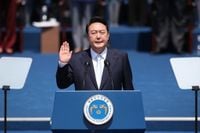The Constitutional Court of South Korea is set to announce its decision on the impeachment of President Yoon Suk Yeol on April 4, 2025, at 11:00 AM local time (4:00 AM in Italy). This decision comes after Yoon was impeached by the National Assembly on December 14, 2024, following his controversial proclamation of martial law on December 3, 2024. The court's ruling will determine whether Yoon will be reinstated or permanently removed from office, a critical moment in South Korea's political landscape.
Yoon's martial law declaration, which he revoked after just six hours, was justified by him as a necessary measure to combat what he described as the abuse of parliamentary majority by the opposition Democratic Party. In his final statement before the court on February 25, 2025, Yoon claimed his actions were an appeal to the public to overcome 'anti-state forces' and sympathizers of North Korea.
The anticipation surrounding the court's decision has already influenced financial markets, with the South Korean won strengthening against the dollar and the Kospi stock market index rising by 1.5 percent after the announcement of the verdict date. The Constitutional Court, which currently has eight judges with one seat vacant, requires at least six judges to vote in favor of Yoon's removal for it to be confirmed.
This impeachment process marks a significant moment in South Korea's political history, as it could lead to the second presidential removal in the country’s history, following the ousting of former President Park Geun-hye in 2017. Conversely, overturning the impeachment would also be historic, as it would represent a significant shift in power dynamics.
The political crisis that began with Yoon's martial law declaration has deepened existing divisions within South Korean society. Polls indicate that 50-60% of the population supports Yoon's impeachment, yet there is a stark divide along party lines. About 84% of conservative party supporters oppose the impeachment, while a striking 97% of Democratic Party supporters favor it.
Yoon's justification for martial law, citing the presence of 'anti-state agents' within government institutions, has fueled further polarization. The Democratic Party has leveraged its parliamentary majority to initiate impeachment proceedings against several officials in Yoon's administration, fostering a narrative that has resonated with many of Yoon's conservative supporters.
The political climate has been further complicated by the recent impeachment of Prime Minister Han Duck-soo, who was removed from office for refusing to appoint a new judge to the Constitutional Court. The court has since reinstated Han, reflecting a trend of judicial decisions favoring conservative positions.
As the court prepares to deliver its verdict, many observers are closely watching how it will navigate the politically charged atmosphere. The implications of the decision are vast: should Yoon be removed, the country would face new presidential elections within 60 days, potentially ushering in a new political era.
However, if the court decides to annul the impeachment, Yoon would regain his presidential powers, allowing him to continue his term until 2027. This scenario would likely embolden his supporters, who have rallied against what they perceive as an unjust process.
The stakes are high, not only for Yoon and his administration but for the future of South Korea’s democracy. The ongoing crisis has seen increased tensions, with protests erupting both in favor of and against the impeachment. The potential for violence remains a concern, as evidenced by recent incidents where supporters of Yoon clashed with opposition groups.
As the nation awaits the court's decision, the political landscape is fraught with uncertainty. The outcome could either solidify the conservative hold on power or pave the way for a shift towards a more progressive governance under the Democratic Party, led by Lee Jae-myung, who is currently positioned favorably in polls.
The complexities of this impeachment process highlight the evolving nature of South Korean politics, where public sentiment can rapidly shift in response to unfolding events. The court's ruling will not only affect Yoon's presidency but will also set a precedent for future political actions and the stability of democratic institutions in South Korea.
In summary, the upcoming verdict on President Yoon Suk Yeol's impeachment is a pivotal moment that could reshape the political landscape of South Korea. With deep societal divisions and high public interest, the decision will resonate far beyond the courtroom, influencing the trajectory of the nation's democracy.




